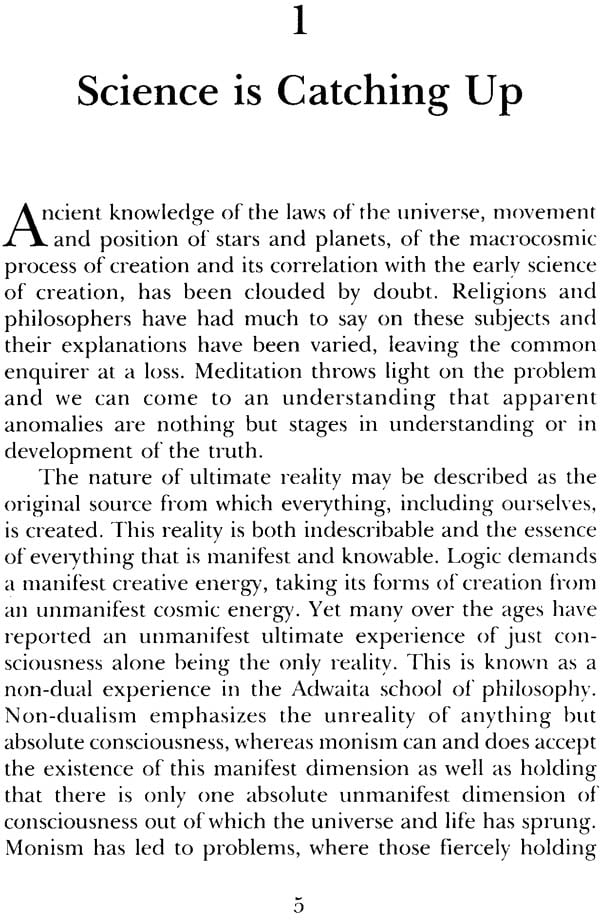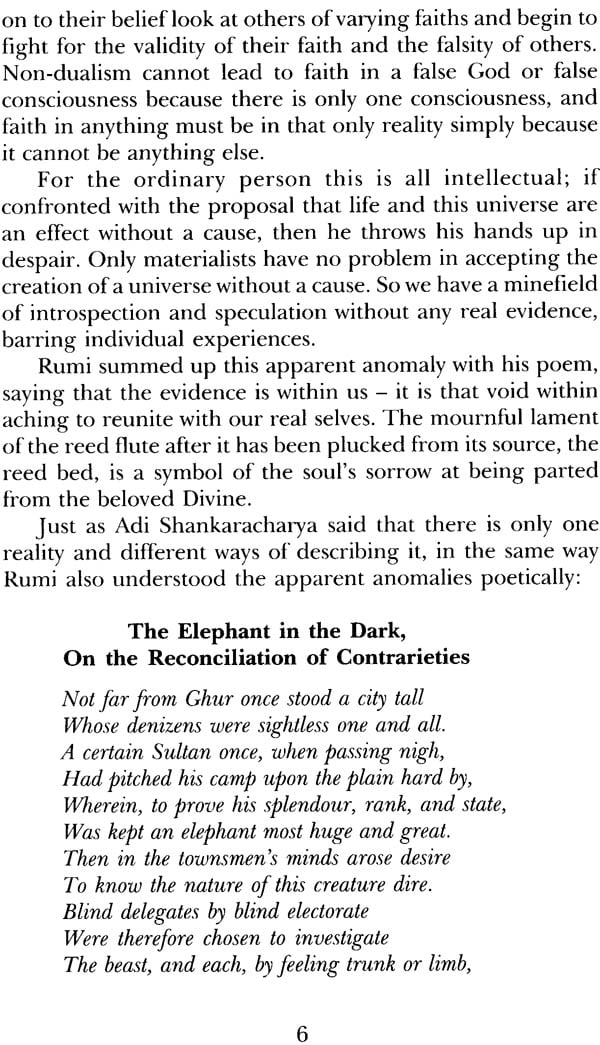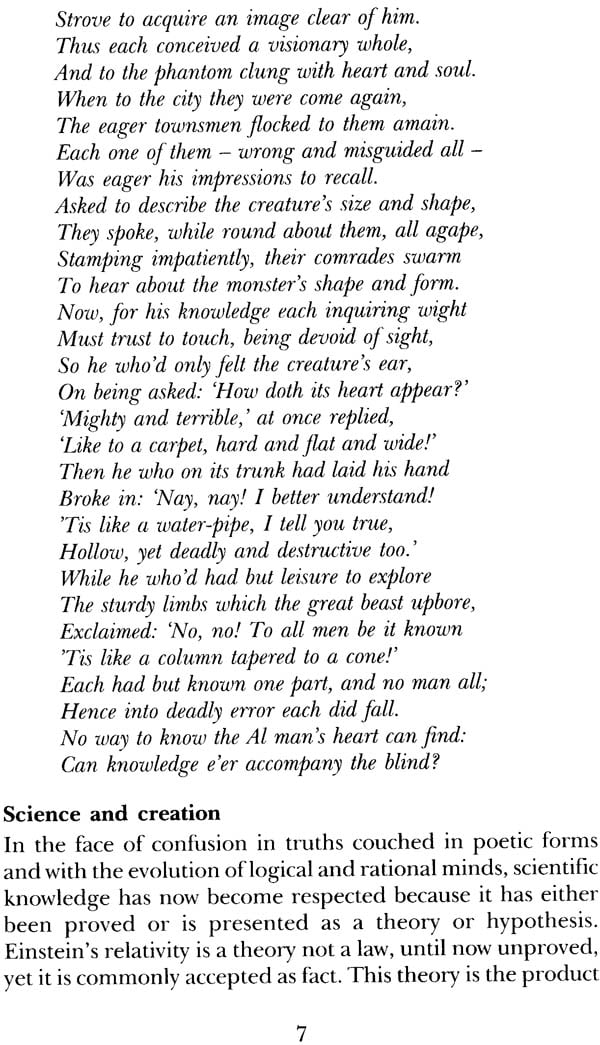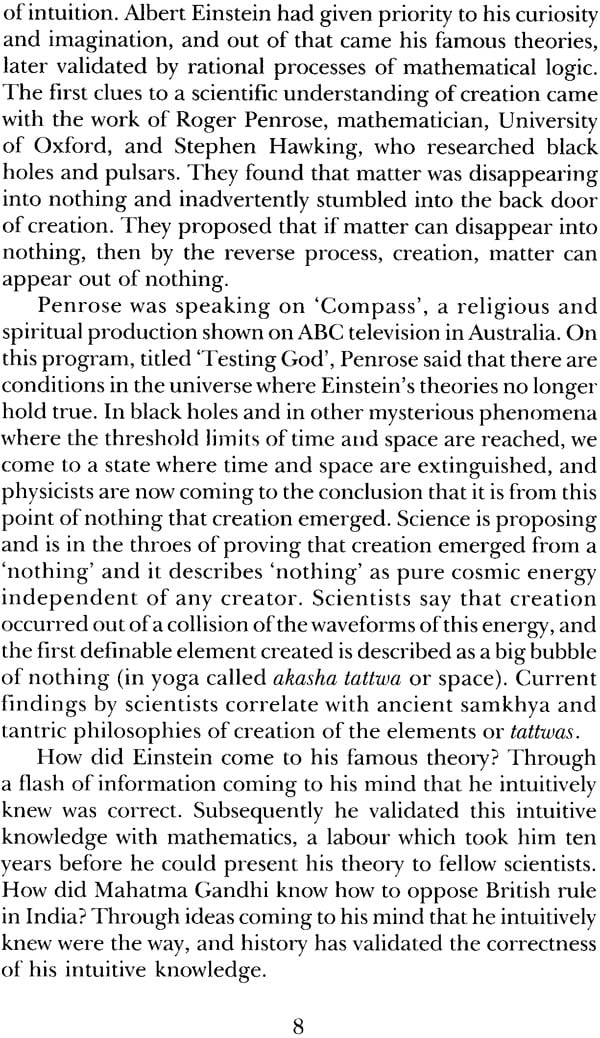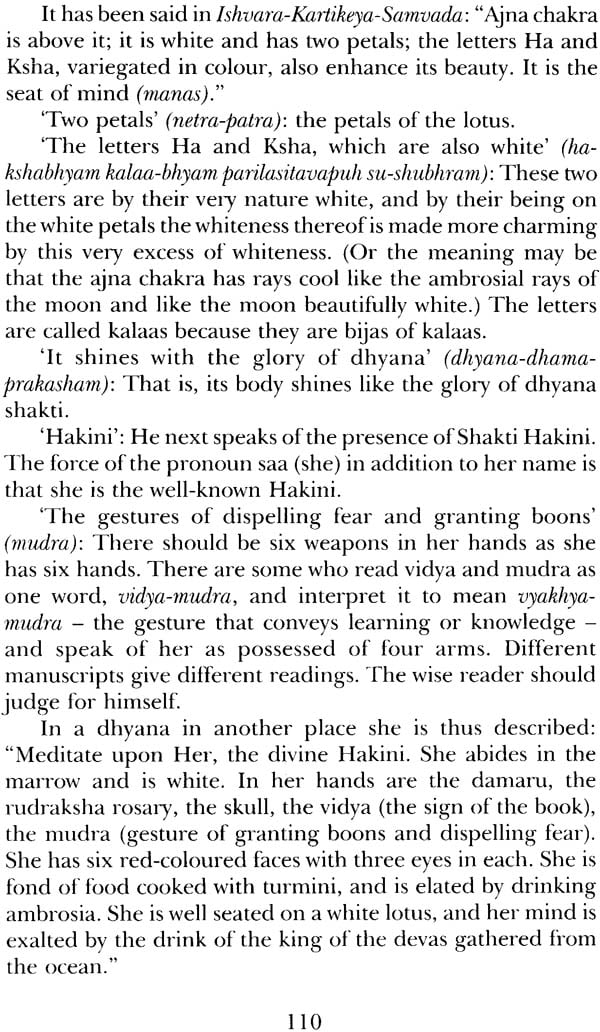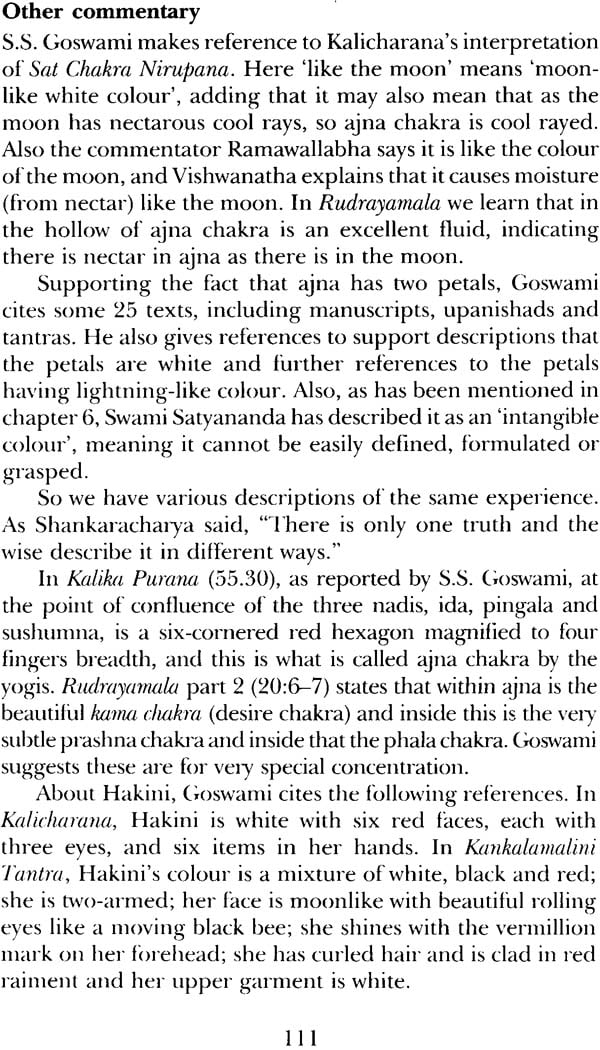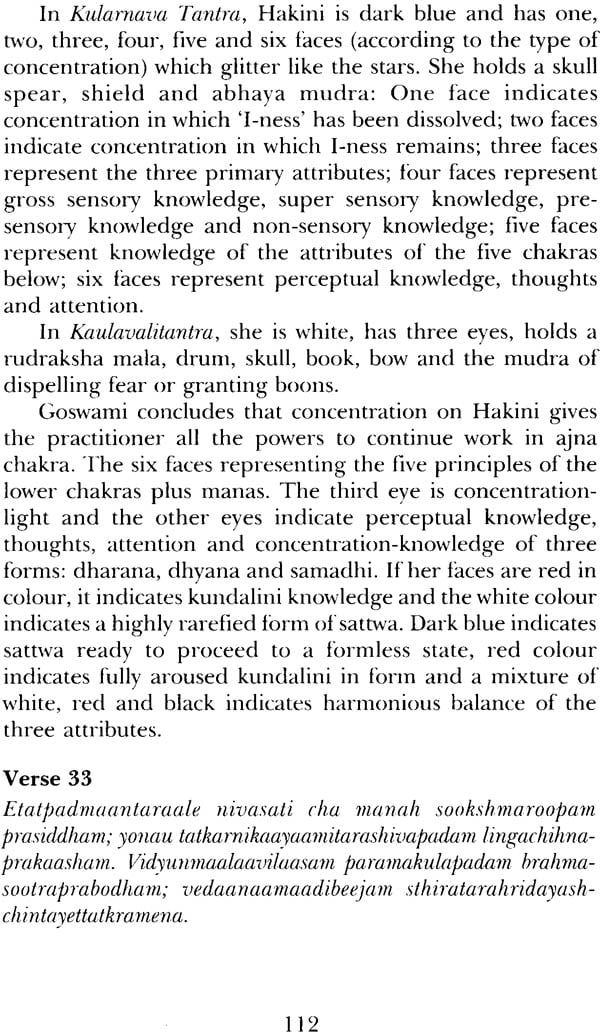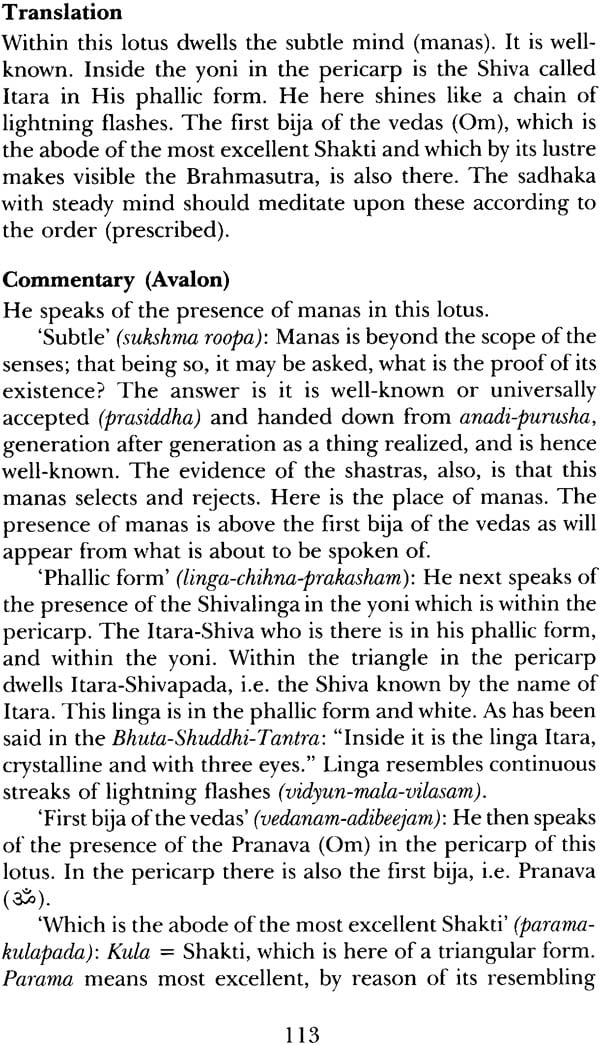
Ajna Chakra
Book Specification
| Item Code: | NAE988 |
| Author: | Rishi Nityabodhananda |
| Publisher: | Yoga Publications Trust |
| Language: | English |
| Edition: | 2010 |
| ISBN: | 9788186336809 |
| Pages: | 153 (6 B/W Illustrations) |
| Cover: | Paperback |
| Other Details | 8.5 inch X 5.5 inch |
| Weight | 200 gm |
Book Description
While knowledge of the external world is gained through the sense, it is through our sixth senses, ajna chakra, also known as the third eye or the eye of intuition, that higher intelligence, both unmanifest and manifest, is experienced. Awakening ajna chakra is opening the channel to experience answers to what lies beyond external reality, questions every seeker.
This new edition of Ajna Chakra by Rishi Nityabodhnananda has been revised and updated. Included are discussions on kundalini yoga, ajna chakra in the tantric texts. Yogic practices to awaken ajna chakra, attempts by science to validate dimension of consciousness beyond objective external reality, and research into the role of the pineal gland and its relationship with ajna chakra.
Rishi Nityabodhananda graduated in Metallurgy from the University of New south Wales, Sydney, Australia, in 1967. He joined the Bihar School of Yoga in Munger, and on Basant Panchami, 1970, he was initiated into pooma sannyasa by Swami Santayana. He currently lives in Australia where he conducts Yoga seminars and satsangs, and ruminates on the meaning of life and the source of it all. On the 21st February into Rishi sannyasa by Swami Niranjanananda.
I remember an old man from Austria who lost his father during early childhood. He attended the funeral ceremony which was a most solemn occasion, and he was so pained by the sadness of the occasion that he never visited his father's grave again. The old man had fought in the Austrian army in the First World War and stayed in his mother country until Hitler's army forced him out in 1939, when he went to England. He fought with the British army and at the end of the Second World War migrated to Australia where he finally settled down to become firmly established in that country. In 1965, sixty years after the death of his father, he made the pilgrimage back to his motherland. The pangs of his conscience were strongly telling him to visit his father's grave so that he could pay his respects to the memory of his dead father.
After some enquiries with relatives he found the cemetery, but alas, the records were incomplete and no trace of the whereabouts of his father's grave could be found in the files. His country had been ravaged by two world wars and little indeed was left from the pre-First World War era. So he set out with strong determination to systematically examine each gravestone of the huge cemetery. He started his quest in the morning and by late afternoon, in spite of his persistent efforts, he had no success. Dejected, fatigued and exhausted he sat down, and his body fell so that it was supported by his arms with his hands covering his face.
In a flash he was not an old man any more, but a young boy walking behind his father's coffin. He could see his brothers, the inscription on the coffin, the coffin bearers and all the other mourners which made up the procession. This young boy followed in the procession until it came to a hole in the ground. Then, as if coming out of a dream, he returned to waking consciousness and there he was, looking down at the gravestone which bore the inscription of his father. We can understand that this experience had exploded from the unconscious mind, but the eye which had witnessed the experience and coordinated all the movements in the physical body was his third eye or ajna chakra.
I take up this task of rewriting Ajna Chakra (first published in 1973) as an offering to my guru, Swami Satyananda Saraswati. Originally, around 1972, he told me to write an article and armed with some one-sided paper, a pencil and some books on kundalini yoga I just wrote down whatever I could and gave him the result. At the time he said, "I asked you to write an article and you have written a book!" At a first reading of myoid work I am quite astounded at the quality of my effort then and I can only attribute this to the high level of enthusiasm I carried in my early years as a swami, the result of living with the greatest man I have ever met.
Ajna chakra is most significant amongst the whole gamut of chakras and nadis for those taking to the path of kundalini yoga. Kundalini Shakti rises and energizes those parts of the personality we develop, and it is through this intuitive third eye that we can perceive the wisdom of renouncing fame, name, wealth and other worldly and passionate pursuits. Knowledge of the external world is gained through the senses; however, it is through our sixth sense, namely ajna chakra, that other knowledge is gained. There are so many things we know to be true, yet there is no evidence for it, we just know it.
We take to the path of yoga without much knowledge and in search of this knowledge we come across many traditions of spirituality, which are in essence yoga. Yoga may mean union: a unification of the individual with the Super consciousness. Some traditions are self-reliant and do not seek help from a saviour. These paths, such as Buddhism and Jainism, are paths of rigorous inner cleansing, processes of replacement of all selfish drives, ambitions and desires for selfless ones. Only by getting out of our limited selves can we expand through caring for others. It is not desire that binds us, but desire for our own limited self that leads to the things that bind us to worldly life. The process of expansion leads to enlightenment, free from any limitation.
Any discussion on ajna chakra lies within the realm of tantra, and kundalini yoga is a tantra. Tantra is dependent upon the female aspect of consciousness; she is the divine mother and it is to her that we turn to propitiate our link with divinity and to pray for progress in any tantric pursuit. We pray that we may make progress in our endeavors to awaken the Shakti within and walk towards the ultimate goal.
Kundalini Shakti, the primal dormant potential energy which can be awakened, resides in mooladhara chakra, the base of the subtle system of chakras. Shiva, consciousness, resides in sahasrara chakra. In the tantric macrocosmic model every part of Shiva is imbued with Shakti and every part of Shakti is imbued with Shiva. The definable phenomenal universe is Shakti and she has many energy states. Her higher energies are most subtle and her lower energy states are physical. Our state of devolution has rested in such a low state that we identify with the gross material and physical matter and have separated from the ethereal and divine. Now we see the divine as something far off to reach for and we struggle to understand it. The physical reality comes and goes, takes birth and dies, yet we look at it as if it is the reality.
Kundalini Shakti sleeps in the form of a coiled serpent wound around the Shiva lingam three and a half times. We have managed to differentiate matter from consciousness; we have taken the spirit out of physical life and so the spirit has become dormant and an awakened Shakti becomes potential. Our consciousness has become unconscious; it is sleeping and this is our predicament.
With awakening of kundalini comes the dawn of our hidden powers, abilities and inner knowledge, and without some training we become lost in a sea of doubts and confusions. Our own unconscious haunts us with new images and drives; guilt, fear and violence have forced us to suppress so much and with the awakening of kundalini Shakti these experiences are revived. How do we face our own internal horrors? Such awakenings are accompanied by guilt, fear and anger, and this is hard to manage in a timid and polite society.
It is for this reason that many teachers in the kundalini tradition lead their students to first take up the practices for awakening ajna chakra, the third eye, the eye of intuition. Then we can see through the confusion to the way ahead.
| Prologue | ix | |
| Introduction | 1 | |
| 1 | Science is Catching Up | 5 |
| 2 | Science and Religion | 18 |
| 3 | Philosophical Background | 27 |
| 4 | The Guru C hakra | 39 |
| 5 | Kundalini Yoga in Brief | 47 |
| 6 | Ajna Chakra in the Tantras | 58 |
| 7 | Psycho-Physiological Aspects | 63 |
| 8 | Psychic and Mystic Concepts | 76 |
| 9 | Yoga Practices for Awakening Ajna | 89 |
| Appendix | ||
| Sat Chakra Nirupanam Chakra | 108 | |
| Bibliography | 134 | |
| Glossary | 136 |
